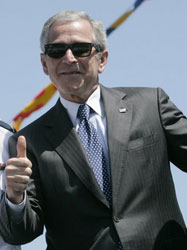| Home | Blog | Ask This | Showcase | Commentary | Comments | About Us | Contributors | Contact Us |

Rating Bush, on a scale of 1 to 10ASK THIS | December 347, 2007Republican presidential candidates avoid talking about President Bush, for obvious reasons. But journalists should press them to say what they think of Bush's legacy, which elements of his presidency they would emulate, and which they would reject. By Dan Froomkin The Republican candidates for president rarely mention their party’s deeply unpopular standard-bearer these days, particularly in their debates. In Harry Potter-speak, President Bush has become He Who Must Not Be Named for Republicans. Bush’s name was uttered only twice during the GOP’s two-hour-long CNN/YouTube debate on Nov. 8. CNN correspondent Carol Costello observed: "It sure seems like Bush has become a four letter word you don't want to mention if you're a Republican running for office. They've taken to talking about him in code -- not daring to say Bush, but not shy about promoting his agenda.” At the Dec. 9 Univision debate in Miami, the name Bush was mentioned once, by Sen. John McCain. And McCain was referring to the president’s brother Jeb, the former governor of Florida. At yesterday’s Des Moines Register debate, the Bush name again came up only once. This time, it was former governor Mitt Romney talking about the current president's dad. The reasoning is obvious. Publicly identifying with Bush is a losing proposition overall, given his dismal job-approval ratings. But attacking the president risks upsetting the Bush loyalists who, while few in number, make up a good chunk of Republican primary voters. Furthermore, keen political observers have noted that Republicans are very eager not to make 2008 a referendum on Bush, because on those terms, there is little doubt they would lose. And yet, what the GOP candidates think of the Bush presidency – what they consider its strengths and weaknesses, which elements they would emulate, which they would reject – is crucial information for anyone trying to figure out what they would be like as president themselves. In fact, it’s hard to imagine what could be more important. As it happens, there is one way to get the candidates to address the Bush legacy in their debates or elsewhere. And that’s to ask them. Here are some possible questions: Q. Do you approve of disapprove of the job President Bush is doing? Q. On a scale of 1 to 10, how would you rate Bush as president? Q. What would you consider some of Bush’s greatest successes? Q. What would you consider some of Bush’s greatest failures? Q. Had you been president, would you have invaded Iraq? Q. If you had to give President Bush a grade for how he managed the war in Iraq, would it be an A, B, C, D or F? Q. What decisions if any would you have made differently if you had been in charge these past seven years? Q. How would you assess President Bush’s credibility? High? Low? Q. Do you approve of the job Vice President Cheney is doing? Q. Historically, the vice president has been in a more subordinate role. Do you think Bush was overly influenced by his vice president? Would you expect your vice president to serve a similar function? Q. Historically, a main job of national security adviser has been to serve as an honest broker between other parties, to make sure the president was making decisions based on accurate information, and to present the president with alternative options and dissenting views. By most accounts, Condoleezza Rice was not that sort of national security adviser. Do you think Condoleezza Rice did a good job as national security adviser? Would you expect your national security adviser to operate differently? Q. Do you feel President Bush has been operating in too much of a bubble? Q. President Bush rarely ventures out in public, and almost always talks to invitation-only audiences. Historically, presidents have appeared at events that were open to the public, at least in part to make it clear that they had been chosen to represent the whole country, not just those who voted for them. Would you return to this tradition? Q. Would you continue President Bush’s practice of using signing statements to quietly assert his right to ignore legislation passed by Congress? Q. President Bush’s lawyers have asserted that there are few Constitutional checks on a wartime president. Do you agree? And would you consider yourself a wartime president? Q. Do you think President Bush is within his rights to assert executive privilege to block the testimony of White House aides in the investigation of the politically-motivated firings of U.S. Attorneys? Would you do likewise in similar circumstances? Q. Some critics have accused the Bush White House of being dominated by politics, at the expense of policy. Do you think Bush got the balance between campaigning and governing about right? Got more questions? Post them as comments.
|
||||||||||||




